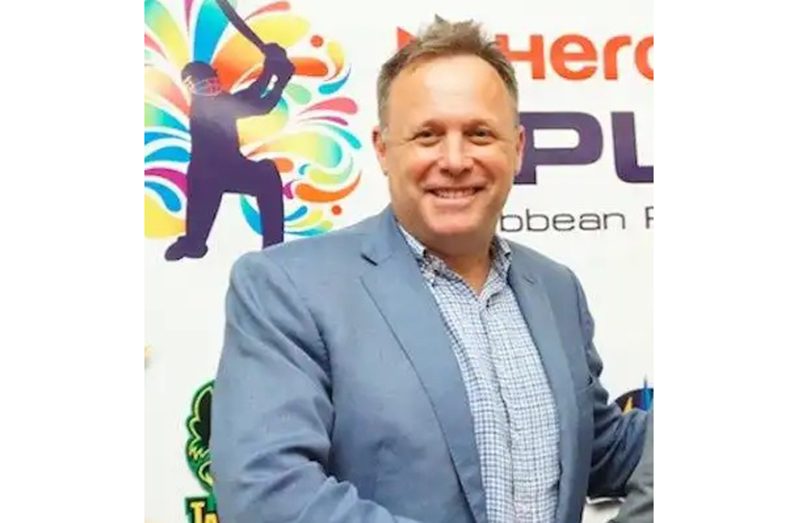KINGSTON, Jamaica, (CMC) – Chief executive officer Pete Russell said the partnership that the Caribbean Premier League (CPL) enjoys with Cricket West Indies has helped to further develop the sport in the region, pushing back on suggestions it has not.
Russell said the Caribbean’s premier Twenty20 tournament has successfully heightened the interest and enthusiasm of fans towards the sport, especially considering the challenges that the West Indies men’s team has faced on the international stage over the past two decades.
Recently, Jamaica Cricket Association (JCA) president, Billy Heaven bemoaned the agreement between CPL and CWI, and he said there was a need for the arrangement to be revisited to ensure enhanced returns on investment for the sport in the Caribbean.
Heaven, also a CWI director, was speaking amid public outcry over the withdrawal of the Jamaica Tallawahs franchise, which has left the country without a CPL presence since the tournament was founded.
He said the agreement struck 12 years ago was “disadvantageous to Jamaica” and other regional countries, as it did not provide significant enough value. But Russell disagrees.
“It’s excellent,” Russell told the Jamaica Observer about the relationship with CWI. “I speak to the president, CEO, and a number of other members of staff at CWI on a daily basis.
“At the end of the day, we’re all aiming and striving for the same goal. We want, obviously, [for] West Indies cricket to be top of the tree; we want fans to re-engage with the game across the region, and we want a flood of development players to come through, so the future of West Indies cricket is secure.
“We’re all singing from the same hymn sheet. It was always a bit tricky in the early days, but I think we’re way past that now, and it’s a case of working together for the betterment of West Indies cricket.”
Russell said CPL had paid close to US$50 million to players since the start of the League, and that this has enabled several players to make a decent living out of the sport.
“That’s very important, and it takes the burden off CWI because, obviously, we’re paying the salaries, and not CWI,” he said. “People fail to remember that if CWI are going to be able to employ all these cricketers, they have to find funds from somewhere.”
This brought into sharp focus the decision of the ownership of the Tallawahs to repatriate the franchise to CPL after citing a lack of support from the Jamaica government.
Matches have also not been held in the country for the past four years, but Russell said CPL was grateful for the support other Caribbean governments had shown, including Antigua, where a new franchise to replace the Tallawahs is to be located.
“It’s very strong, and we don’t underestimate the strength of those relationships (with governments), and the importance of those relationships,” he said. “Sports tourism is a very big deal around the world; you only have to look at some of the major sports to see how important it is — the Qatar [Fifa] World Cup being an obvious example of that.
“We understand now that CPL is now at a level where we do get fans flying to watch these games and enjoying the games — whether that’s inter-island travel; or fans coming from New York, Miami, other parts of the USA; and Canada as well. We understand there’s an inherent value that CPL brings.”
He added: “But it’s more than that; it’s the social aspect as well. It’s the fact that local fans can get behind their team and go and support them (local players obviously have a huge role to play in that), and small businesses, when we’re there, obviously make money — and that’s really the key.
“We come into countries like St Lucia, St Kitts, and Barbados, for example — periods in the year when there’s not naturally high-season tourist times — so for those businesses it’s great because we come in with a lot of people and we spend money, so it’s good for the local economy.
“There’s a number of reasons why the governments enjoy having CPL there, and they are important to our ecosystem as well.”
Heaven questioned the role of CPL in actual cricket development across the Caribbean and tends to emphasise the entertainment value of the sport rather than the product.
Russell said the League has sparked interest in the sport among a new group of fans and wants to help with the revival of the sport in the Caribbean.
“I would say until CPL came along, things weren’t looking great in terms of getting fans in stadiums to watch games” he said. “That’s something we try to reignite, making sure those fans feel passionate about the game, and we’ve done that through making sure there’s that local rivalry between teams; I think that’s important.
“People love to see full stadiums. If you look at the finals that we had in Guyana (last year), it was fantastic. It was a great show of colour, noise, and excitement — and that’s because of cricket.”
He said: “[Our job] is really to support anything that CWI comes up with to get cricket played at schools, at the junior level, and that’s the bit that we need to work on.
How do we get primary school [children] into a system that is going to create the next Brian Lara, Chris Gayle, or whoever it happens to be? We have plenty of examples of players who do a good job in CPL, but then go to international leagues and do well elsewhere and make a decent living out of it.”
Perennial bridesmaids Guyana Amazon Warriors won the CPL last year for the first time on the sixth attempt when they beat three-time champions Trinbago Knights by nine wickets in a low-scoring Grand Final on home soil at the Guyana National Stadium.



.jpg)








